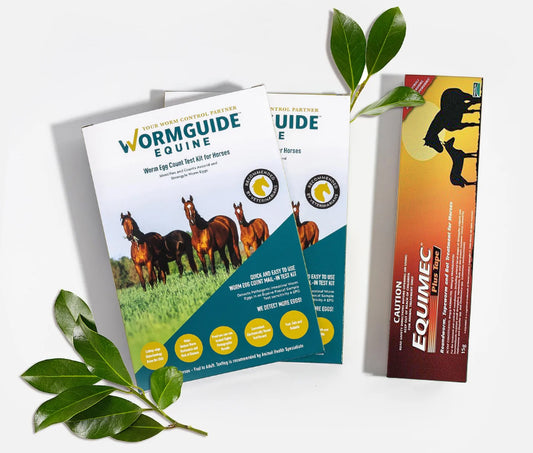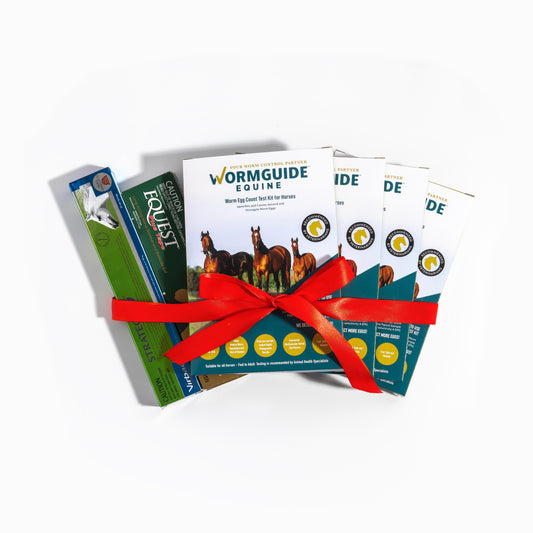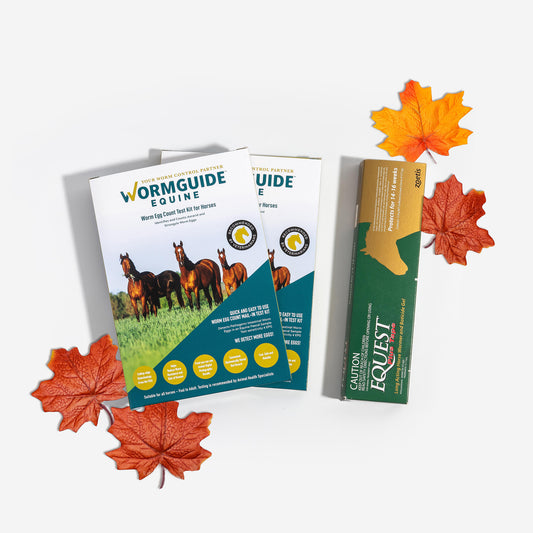With spring upon us, it`s time to start thinking about horse worm control management.
Spring has sprung! And with it comes a whole host of events … longer daylight for more time in the saddle, pasture growth, horses shed their winter coats, spring carnival competitions, start of the breeding season, horse babies now yearlings, and worm control management.
Horse worms prefer moist warm climates of between 22 and 30 degrees Celsius for optimal development and survival on pasture. Whilst we have a range of climatic zones with different seasonal variations throughout Australia most regions observe peak transmission during spring.
Your Spring Advantage Set. Worm the right way
Apply best practice to make positive changes to your worm control approach.
The convenient Spring Advantage Set provides everything you need to monitor your adult horse`s egg shedding level, apply a baseline worming treatment and check the efficacy of the deworming drug.
The Spring Advantage Set is the test, treat, check advantage you`ve been waiting for!
Test: Super Surveillance FEC for type of worm and number of eggs
Treat: Spring baseline treatment
Check: The Truth Teller FEC 10-14 days later to compare the number of eggs. Worming failure or success? This one is the most important, there isn`t supposed to be any eggs. If there are eggs, further investigation is warranted.
How to put together a meaningful worm control program.
Spring is time to:
- Apply baseline treatment to all horses
- Check the recommended worming drug works
- Monitor strongyle worm egg shedding levels in adult horse
- Test yearlings for ascarids (roundworm)
1. Apply baseline treatment to all horses.

Aw..that`s love!💝
Up-to-date recommendations define a baseline of two treatments during peak transmission times, usually spring and autumn. It`s the basic foundation treatment for all horses.
With the spring seasonal change, it`s a good time for our efforts to be focused on the worms within horses. Faecal egg counts (aka worm egg counts) only account for two intestinal worm categories: ascarids (roundworm) and small strongyles.
You would want to make sure you have your bases covered for tapeworms and large strongyles (bloodworms).
You don`t want bloodworms

Photo; Dr Martin Nielsen@martinKNielsen
Can you pick the large strongyle (bloodworm) ? ... hard to tell!
If you only deworm your horses based on egg count results, you risk the return of the dangerous bloodworm capable of causing fatal disease. Because indiscriminate, misguided and overuse of worming products cause resistance, most countries in Europe have restrictions (prescription only) on the use of dewormers. However, a few countries have observed the emergence of the bloodworm.
Although rare nowadays in managed horses we need to keep this one at bay. We know that if a horse never gets wormed, it is at risk of getting bloodworms.
You don`t want tapeworms

Photo: Dr Martin Nielsen@martinKNielsen
Tapeworms are capable of causing disease and horses never develop any immunity to them. They are considered widespread in Australia and cause of ileal colics! Where there are horses on grass, there are tapeworm.
You want to control small strongyle worms

Dr Martin Nielsen shows us just how tiny these worms are. Can you see them?
All horses have small strongyles. The encysted larval stage of this worm can cause a serious disease called larval cyathostominosis and make horses very sick. Even though it is not very common, it can happen!
2. Check the worming product you use works - once a year

Do you know if your chosen wormer actually works?
How do you know?
Do you know if you`re having worming failures or not?
We need to test the dewormers we use rather than just medicating our horses with random deworming drugs without knowing if they even work.
It is impossible nowadays to put together a meaningful deworming program without knowing what works and what doesn`t.
For herd health check resistance once a year

Are you wasting time, effort, and money on worming products that don`t work on your property? Find out before it`s too late!
The good thing with the Gold Standard Resistance Detection Service is that you don`t have to test every single horse. You only need six egg positive horses from any given group.
The classic Faecal Egg Count Reduction Test (FECRT) is performed with a group of horses, collecting faecal samples at the day of treatment and again 14 days post treatment. Then the percent strongyle egg reduction is calculated.
We are not really testing the horses; we are testing the worm population on your property. All horses share the worms, so each horse is a biological sample of all the worms.
Spring is a good time for baseline treatment to all horses and at the same time check for resistance.
3. Monitor worm egg shedding levels in adult horses twice a year.

Monitoring strongyle worm egg shedding levels is recommended to select horses that need more frequent treatments.The Super Surveillance FEC is used to monitor the number of eggs your horse is releasing in their manure on pasture..
A selective deworming program using FECs is the most sustainable way you can manage worming of your adult horses. It eliminates the rote deworming of all horses, with the goal of preserving our effective worming products for horses that really need them.
Most horses are low egg shedders, however typically there are a few horses that always have high egg counts (high egg shedder). They are responsible for most of the eggs on pasture re- infecting themselves and infecting other horses
Although egg shedding levels are maintained by horses most of their lives, there is always the possibility that a low shedder shifts to become a high shedder.
WormGuide`s “What do my Results Mean? Guide provides an example of a selective (targeted) worm control plan. Please confirm with your vet if the worm control plan is appropriate for your situation and climatic region.
4. Test yearlings for roundworm

Horse babies are now yearlings. We are targeting strongyles and tapeworms in this age group. Reliable egg counts that identify ascarids (roundworm) are useful in this age group for two purposes:
- Checking for presence of roundworm with the Super Surveillance FEC
- Checking for treatment efficacy with the Truth Teller FEC reduction test if roundworm is present
Roundworm can sometimes occur sporadically or a second wave in young yearlings and should be treated.
Here`s to WormGuiders Proud!

WormGuiders like Jenny know what worming treatment works and what doesn`t on her property. Jenny says, “No more guesswork or hoping (assuming) I’m treating my horses right.”
Many WormGuiders have already checked the efficiency of the baseline deworming drug class using the Autumn Advantage Set. So... all that is required this spring is the Super Surveillance FEC to monitor egg shedding levels and then the baseline treatment.
Easy as that!
WormGuide
So, with WormGuide, you can rest easy knowing that your horse`s meaningful worm control includes faecal egg count testing that uses the most reliable and precise technique available.
Do you want to improve your worm control strategy and resistance control based on the latest comprehensive set of guidelines?
Swing into spring today and worm the right way.
BTW
We`re not making this stuff up
Grab yourself a cup or glass of your favourite something, put your feet up, things are about to get real!
For further information you can head over to the article “Systematic review of gastrointestinal nematodes of horses from Australia”
The authors are members of the Australian Equine Parasitology Advisory Panel supported by AgriFutures Australia and Boehringer Ingelheim Animal Health Australia.
Here you will read about the major concern of anthelmintic (dewormer) resistance and the many reports of worming failures from NSW, QLD and VIC against all commonly used worming products. And the disturbing results of a survey they conducted.
You can also go to Breaking News! Evidence of horse worms in Australia that can no longer be killed by all the worming products on the market.











